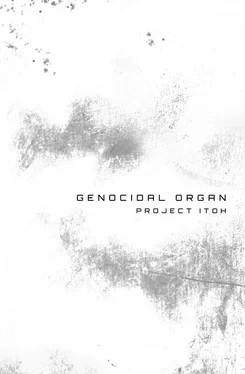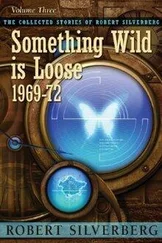Project Itoh - Genocidal Organ
Здесь есть возможность читать онлайн «Project Itoh - Genocidal Organ» весь текст электронной книги совершенно бесплатно (целиком полную версию без сокращений). В некоторых случаях можно слушать аудио, скачать через торрент в формате fb2 и присутствует краткое содержание. Год выпуска: 2012, ISBN: 2012, Издательство: Haikasoru/VIZ Media, Жанр: Старинная литература, на английском языке. Описание произведения, (предисловие) а так же отзывы посетителей доступны на портале библиотеки ЛибКат.
- Название:Genocidal Organ
- Автор:
- Издательство:Haikasoru/VIZ Media
- Жанр:
- Год:2012
- ISBN:9781421550886
- Рейтинг книги:4 / 5. Голосов: 1
-
Избранное:Добавить в избранное
- Отзывы:
-
Ваша оценка:
- 80
- 1
- 2
- 3
- 4
- 5
Genocidal Organ: краткое содержание, описание и аннотация
Предлагаем к чтению аннотацию, описание, краткое содержание или предисловие (зависит от того, что написал сам автор книги «Genocidal Organ»). Если вы не нашли необходимую информацию о книге — напишите в комментариях, мы постараемся отыскать её.
Genocidal Organ — читать онлайн бесплатно полную книгу (весь текст) целиком
Ниже представлен текст книги, разбитый по страницам. Система сохранения места последней прочитанной страницы, позволяет с удобством читать онлайн бесплатно книгу «Genocidal Organ», без необходимости каждый раз заново искать на чём Вы остановились. Поставьте закладку, и сможете в любой момент перейти на страницу, на которой закончили чтение.
Интервал:
Закладка:
I gritted my teeth and chucked the gun away.
All this happened in a flash—Lucia was still standing where I had left her.
I scanned the area quickly but could see only the man approaching from behind. But I couldn’t believe there were only two of them. I had to be on the lookout for an ambush.
So far I had avoided drawing my gun. At this rate, I might still be able to explain away my actions and my skill without blowing my cover. A stint in the army during my youth or something. I was still in control. At least, that’s what I thought until the man behind us caught up to us.
Then I was no longer in control.
Fire.
Indexfingermiddlefingerringfingerlittlefingerthumb.
Electric shock.
My senses were blown away in a blast of thunder.
My fingertips, my toes, my eyes, all throughout my body—an unbelievable, searing hot pain. All the extremities of my body were on fire, as if they’d all decided to go insane at the same moment. I almost blacked out from sheer agony.
“Mr. Bishop? What’s the matter? Charles? Charles?”
This was what it must have felt like to burn up from the inside out.
Lucia had a look of panic on her face. She placed a hand on my shoulder. I realized the man approaching us from behind was no longer running. He had his mobile device pointed at me and was strolling gently in my direction.
“Run away .” The pain in my extremities was so severe it took me a few seconds to squeeze the words out. “Lucia, run.” The man kept on walking toward us. I realized it was the scruffy young man I had beaten up in the alleyway.
Perhaps the pain I was feeling numbed my sense of time, but it seemed to me to take an eternity before Lucia finally took heed of my words and turned to run away. The pain in my legs grew too much to bear, and I collapsed prostrate onto the historic cobblestones of old Prague.
I screamed wordlessly, acknowledging my total and utter defeat.
“There’s no need for you to run away, Lucia.”
I could just about make out the voice. Through the pain that was forcing my body apart, through my seeping consciousness, I turned toward the speaker to see his face.
A face I had seen numerous times in various pre-mission briefings.
The face of the man who had eluded us all these years.
Lucia was rooted to the spot, staring at John Paul.
6
I felt cold stone against my face long before I could open my eyes.
I checked for the searing agony, but it was gone. I managed to look at the fingers that had been causing me so much pain only a minute ago. Neither red nor white. No different from usual.
My wrists had been taped together. Gingerly I stretched out my fingertips and pressed them against the ground, ever so gently at first. No pain. I pushed myself up and looked around. I was in a dark room, surrounded by what looked like a giant chessboard.
“I have no idea who you are, although I assume you’re here to try and kill me.”
I turned around to see who the voice had come from. It was a shadowy figure, his face backlit by moonlight that crept in through a window covered by a metal grill.
John Paul.
The Lord of Genocide.
“It seems that the American government has been sending hit squads into the countries where I’ve been. I’ve been hearing reports that the generals and politicians I helped out were being killed off,” he said.
“That can’t be a nice feeling, knowing that any day you could be next,” I said.
John Paul shrugged. “When I tried to return to Lucia’s apartment I realized immediately that some clumsy Secret Service agent was trying to tail me. So I put the place under surveillance for a while, and sure enough you showed up. You were obviously Forces, which did trouble me somewhat, I’ll admit.”
“Why do you think I’m in the Forces?” I stared at John Paul. A trained linguist turned PR flak. It bothered me that this civilian could tell the difference between the CIA and Special Forces so easily. It also bothered me that he was talking to me as if we were fellow professionals.
“As I’m sure you know, I’ve spent the last few years of my life in war zones,” John Paul said. “A long time. Places where no UN troops, let alone US soldiers, ever intervened. But there were occasionally PMCs, there to provide tactical and strategic consultancy. They would train up local troops, molding the rabble into a semblance of a proper army. Most PMC soldiers are, as I’m sure you know, ex-Special Forces who crossed over to private work in order to double their paycheck. Well, I started watching these people, and in watching them I started to notice the special type of walk that only trained soldiers have. It wasn’t that hard for me to do. After all, my work as a linguistics researcher was basically frequency analysis—identifying the hidden patterns that lurk behind apparently mundane agglomerations of data.”
I pushed myself up with my bound wrists so that I was sitting on the floor and facing John Paul directly. Like one of Jesus’s disciples sitting at the feet of his master.
“Speaking of patterns,” I said, “the NME was funding your language research, and you were looking for some sort of patterns there. What I don’t understand was why DARPA was involved in the first place. What benefit was there to them in funding an academic thesis? Why was that a matter of national security?”
“Ha. So you’re telling me that neither your superior officers nor the fine staffers of Washington ever bothered to explain that to you? How typical.”
The moonlight was now shining brightly on my face. From where John Paul was standing I would have looked deathly white.
The former scholar put his hand to his mouth before launching into a calm, deliberate lecture by way of explanation.
“The defense establishment wasn’t involved with my research at first. It was academic work, pure and simple. All the materials I was using were in the public domain. Archives from Nazi Germany, radio broadcasts, magazines, literature, military communications. I acquired all sorts of data from the Nazi era—prewar as well as wartime. Much of it was already digitized; I had my assistants convert the materials that only existed in hard copy. Then I parsed it all. Grammatical analysis, in layman’s terms.”
Research into Nazi rhetoric. I tried to imagine how it would relate to university work. Class 101: Fascist Communications—Discourse for Dummies. Don’t embarrass yourself in front of your fellow National Socialists by making a linguistic faux pas! All this was interesting enough, as an interdisciplinary elective that fell between the domains of linguistics and history. But I still didn’t see how that could be of such interest to the military.
“I published a thesis based on my work,” John Paul continued. “The MIT budget committee called me in not long after. The chairman coolly informed me that my research had been selected for funding by the National Military Establishment, so I needed to run along and present them with my research. I wasn’t wild about the idea at first—it would mean that any further research on the topic would be classified and impossible to publish—but when I realized how many perks there would be other than just the actual funding, I reluctantly accepted. After all, it meant full access to confidential CIA documents and to international traffic intercepted by the NSA. Everything from Pol Pot’s wireless transmissions to the Khmer Rouge to Rwandan radio broadcasts. The NME even arranged for me to have full access to the Russian archives on the Katyn Forest Massacre. Most valuable of all to my research, though, was the raw data from the traffic that the NSA and the CIA had intercepted.”
“And you discovered something from all this?”
Читать дальшеИнтервал:
Закладка:
Похожие книги на «Genocidal Organ»
Представляем Вашему вниманию похожие книги на «Genocidal Organ» списком для выбора. Мы отобрали схожую по названию и смыслу литературу в надежде предоставить читателям больше вариантов отыскать новые, интересные, ещё непрочитанные произведения.
Обсуждение, отзывы о книге «Genocidal Organ» и просто собственные мнения читателей. Оставьте ваши комментарии, напишите, что Вы думаете о произведении, его смысле или главных героях. Укажите что конкретно понравилось, а что нет, и почему Вы так считаете.












